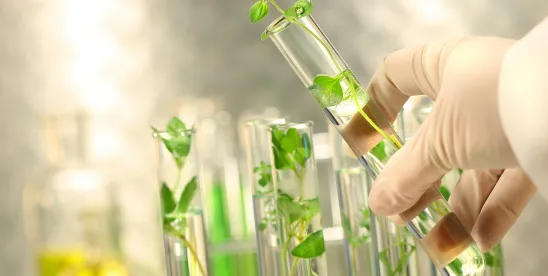The White House Office of Science and Technology Policy (OSTP) published a fact sheet on June 25, 2024, on the Biden-Harris Administration’s actions to advance American biotechnology and biomanufacturing. According to the fact sheet, on June 25, 2024, the White House, members of the National Bioeconomy Board, and the U.S. Departments of Energy (DOE), Defense (DOD), and Agriculture (USDA) convened major biotechnology and biomanufacturing companies, nonprofits, and other stakeholders to highlight progress to date and discuss critical upcoming milestones to support the long-term success of the nation’s bioeconomy. The fact sheet states that in June 2024, the Biden-Harris Administration announced a set of actions to accelerate U.S. domestic biomanufacturing capacity and highlighting progress in the two years since the President signed Executive Order 14081, “Advancing Biotechnology and Biomanufacturing Innovation for a Sustainable, Safe, and Secure American Bioeconomy,” including:
- DOE’s Loan Programs Office announced a $213.6 million conditional loan guarantee to Solugen Inc’s Bioforge Marshall facility in Marshall, Minnesota, that will house three modular trains manufacturing various organic acids for use in the concrete, cleaning, agricultural, and energy industries — “cutting harmful emissions from hard-to-decarbonize sectors while helping deliver healthier communities across the nation.”
- USDA is making available recommendations for revisions to the North American Industry Classification System (NAICS) and North American Product Classification System (NAPCS) codes for the bioeconomy. According to the fact sheet, the classifications provide a systematic organization of both industries (NAICS) and products (NAPCS) and are currently lacking for the bioeconomy. NAICS industries are defined by similarities in production processes. NAPCS products are defined based on use. The recommendations for revisions to the NAICS and NAPCS are guided by the National Institutes of Standards and Technology’s Bioeconomy Lexicon and a study of the feasibility of measuring the bioeconomy by the Bureau of Economic Analysis. The fact sheet states that the revisions will lay the foundation to organize, sustain, and accelerate the growth of the U.S. bioeconomy through data-driven decision-making.
- As reported in our June 25, 2024, blog item, USDA is also releasing a request for information from the public as it explores options for reducing the regulatory burden for modified microbes. The fact sheet states that engineered organisms have the potential to improve agricultural productivity and address sustainability and climate goals. The information USDA hopes to receive will inform how to ensure proportionate oversight that will allow for both safety and commercialization of beneficial products.
- The National Security Council is announcing the newly formed Biopharma Coalition (Bio-5) to support secure biopharmaceutical supply chains, in partnership with the Office of Pandemic Preparedness and Response. The United States, the European Union, India, Japan, and the Republic of Korea will work together to strengthen biopharmaceutical supply chain resilience. The Bio-5, which initially met in a track 1.5 format alongside industry representatives from each entity, will focus on building resilient supply chains for active pharmaceutical ingredients (API) currently sourced primarily from the People’s Republic of China. The five countries will seek opportunities for their governments and the private sector to deepen coordination on policy, regulations, research and development capabilities, and other tools to enhance the resilience of this vital sector.




 />i
/>i

